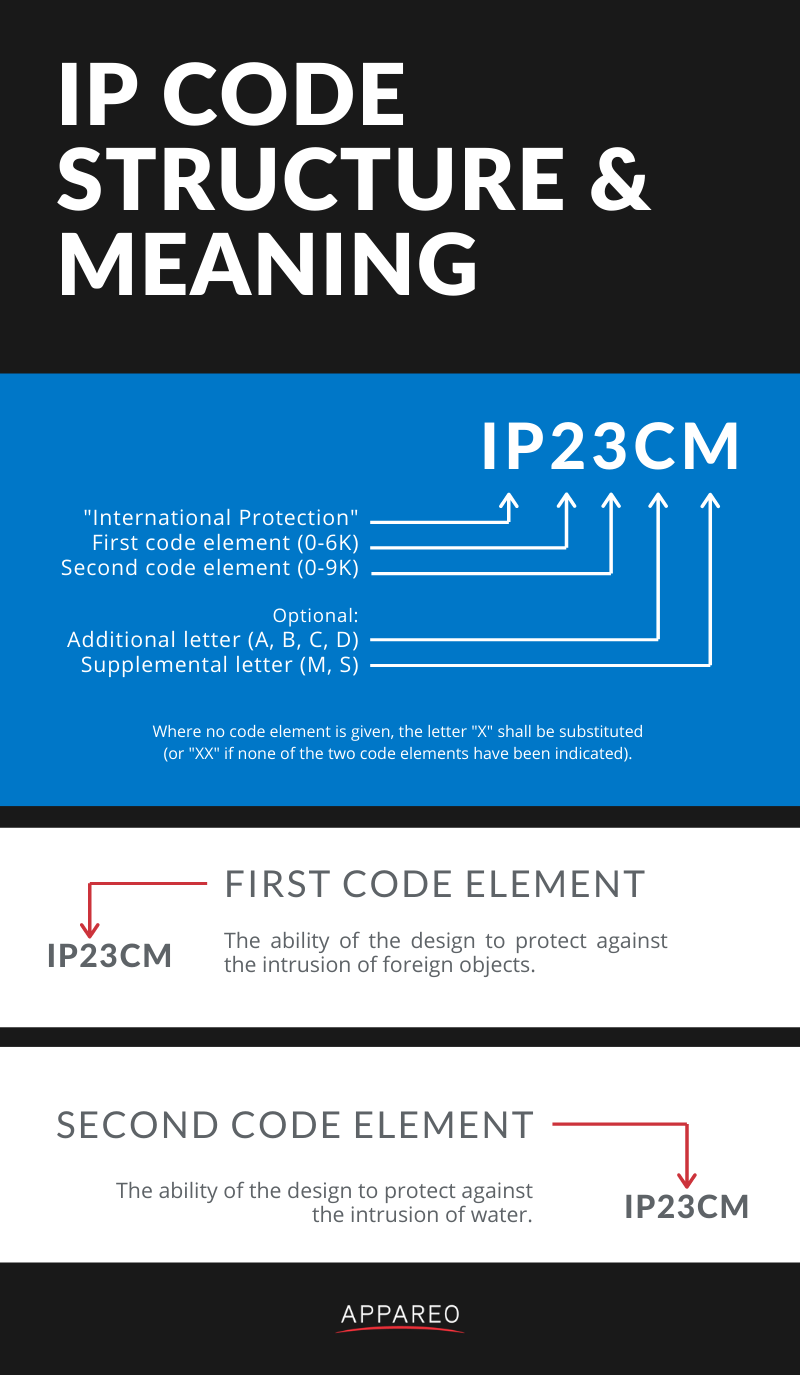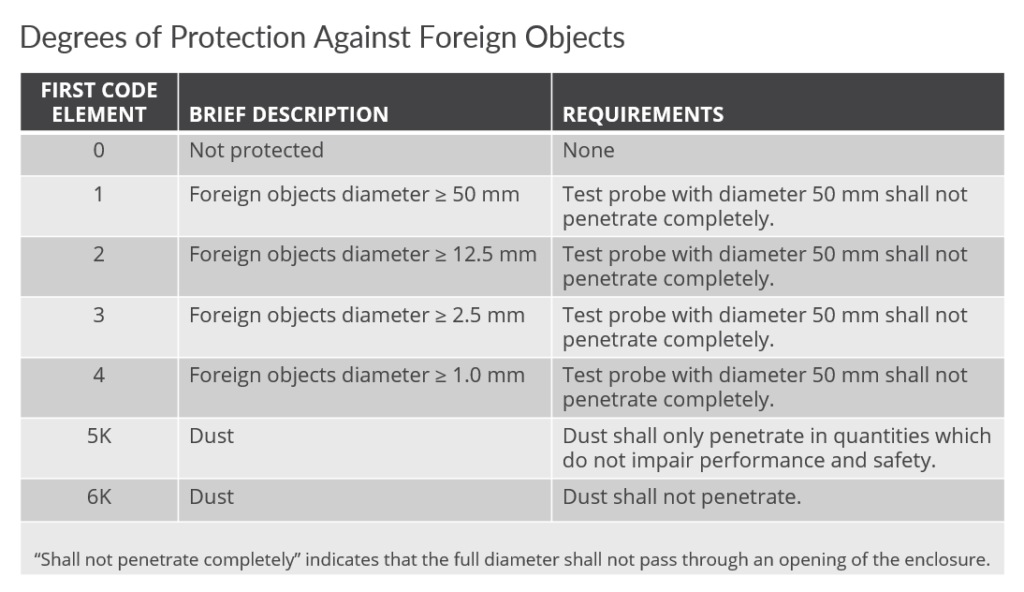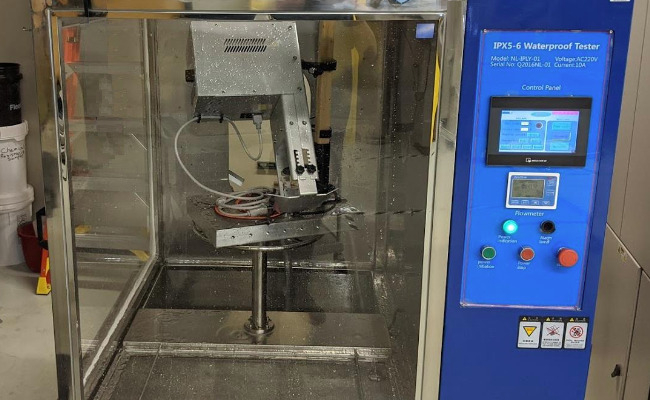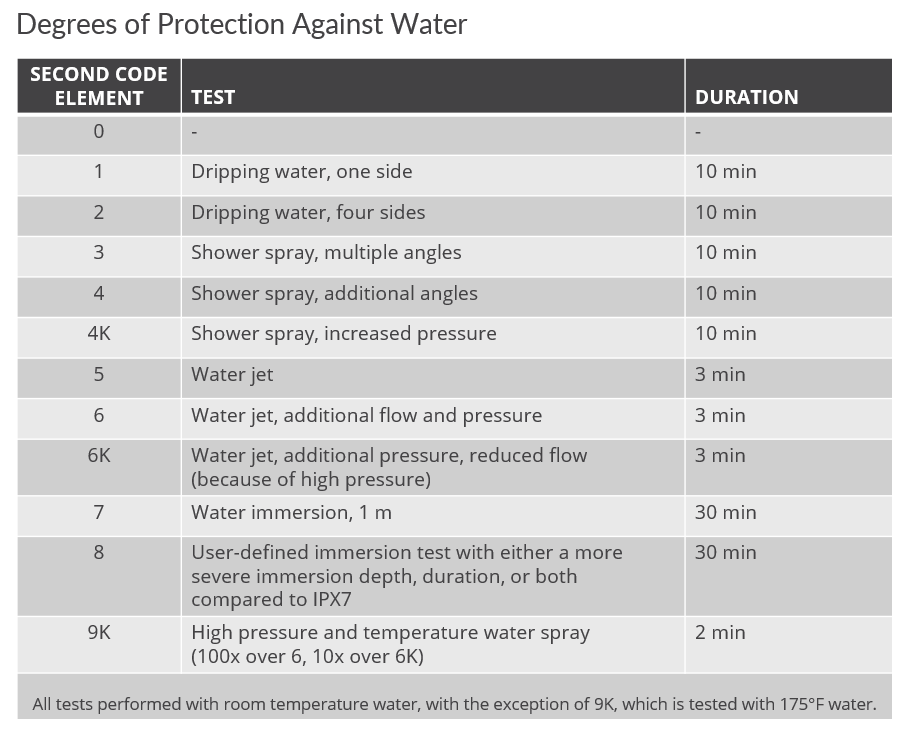Tag Archives for " IP69K "
Understanding IP Ratings for Rugged Electronics
For many years, electronics manufacturers have utilized environmental testing to simulate years of product use in the field. As products fail, teams of engineers have dug into each of these failures to understand them, build better tests to simulate the conditions that created them, and use those tests in design validation to ensure that such failures don’t occur in the field again. In general, environmental tests include a broad spectrum of different challenges to ensure a robust design.
Some common tests are:
- Power input – trying to damage the product by simulating bad power connections or incorrect power supply
- Transit shock – trying to introduce damage from mishandling during shipping
- Particle impact – trying to damage the product due to particles thrown by tires, air blasts, etc.
- Electrostatic discharge – trying to electrically shock the product and damage it
- Chemical resistance – trying to damage the product by exposure to hazardous chemicals potentially occurring in the operating environment
- Ultraviolet effects – trying to damage the product through environmental exposure to light
- Temperature & humidity testing – cycling the product through many cycles of high temperature, humidity, and low temperature to simulate many seasons of outdoor exposure
- Thermal shock – trying to damage the product through temperature shock
- Vibration and shock testing – trying to shake and shock the product into a damaged state
These tests are described by a series of industry standards and tests. One of the most common ratings for environmental suitability seen today in product specifications and datasheets is the IP rating.
What is the “IP Rating”?
In this context IP stands for International Protection Rating, but is often read as Ingress Protection. Looking at this rating provides a more nuanced and descriptive articulation of product capabilities than “water resistant” or “dustproof.” These ratings are described in standards like IEC 60529, DIN 40050-9, and ISO 20563 (which replaced DIN 40050-9). Testing against these ratings produces IP ratings like IP44, IPX5, IP5X, IP65/67, etc.

What does the first number mean?
The first number is associated with the ability of the design to protect against the intrusion of foreign objects that could cause damage to the device or cease its function. The higher the number, the smaller the particle necessary to get inside the device.

Below is an example of the 6K variety of the ISO 20653 test. In this test, to ensure dust will not penetrate the enclosure design, a vacuum is pulled on the device to ensure that it is dust tight. You can see that the enclosure is entirely caked in fine dust after the test.
What does the second number mean?
 The second number is associated with the ability of the design to protect against intrusion of water. The higher the number, the more sealed the device against intrusion of water. When higher numbers are reached, however, there is some nuance as to the method of testing that becomes important. For example, IP69 is not necessarily better sealed than IP67 — they are both very well sealed, just tested against different areas of concern.
The second number is associated with the ability of the design to protect against intrusion of water. The higher the number, the more sealed the device against intrusion of water. When higher numbers are reached, however, there is some nuance as to the method of testing that becomes important. For example, IP69 is not necessarily better sealed than IP67 — they are both very well sealed, just tested against different areas of concern.

What about other ratings?
Manufacturers only publicly rate devices to what they have actually tested against. For example, a device might be tested against IP69K and be totally suited for use in an IP67 environment, but the manufacturer’s initial customer didn’t require the IP67 test, so it was never run. Vice versa, sometimes designs are capable of qualifying and passing higher levels of ingress certification than publicly rated for — especially as it pertains to the difference between IP67 and IP69K.
If you see an ingress certification rating for a device that does not meet your specification as an equipment manufacturer, don’t be afraid to ask your device manufacturer about the device’s suitability for a similar rating.
 Nathan Schneck – Director, Test & Certification
Nathan Schneck – Director, Test & Certification
https://www.appareo.com/2020/10/06/understanding-ip-ratings-for-rugged-electronics/
Appareo Releases Rugged On-Demand Cellular Asset Tracker for Off-Highway Equipment
NEWS RELEASE
Appareo Releases Rugged On-Demand Cellular Asset Tracker for Off-Highway Equipment
With the telematics and logistic groundwork laid by Razor Tracking, Appareo has developed the most advanced and rugged asset tracking device, at an affordable price.
FARGO, North Dakota (June 11, 2020) — Appareo today announced a new product in the company’s line of rugged cellular asset trackers. The Appareo AT-130 (IP69K) will launch first with partner Razor Tracking, a leader in off-highway asset tracking software. These two North Dakota companies joined forces to develop an affordable on-demand asset tracking solution with unmatched durability for use in any industry.
Appareo leveraged its experience building rugged, off-highway, telematic and electronic products to develop an inexpensive, but performant, super rugged cellular product. Razor Tracking, the industry-leading software developer for fleet tracking and operations management, provided the initial logistics software for the AT-130, and laid the groundwork for future logistic integrations.
The AT-130 is an IP69K-rated asset tracking device with cellular and GPS capabilities, a 5-year battery life, and industrial operating temperature range (-40 ℃ to +70 ℃). The IP69K rating certifies the device’s ability to withstand an 80℃ pressure wash at close distance, making this tracker uniquely suited for industrial applications where such cleaning is routine and necessary.
“The affordable AT-130 from Appareo will provide unmatched durability to any industry and bringing this device to market will help our customers operate on another level,” said Eric Mauch, President of Razor Tracking.
“Razor Tracking is the leading software provider for fleet tracking and operations management, especially in the off-highway environments in which we work,” said David Batcheller, President & CEO of Appareo. “We’re very excited to work with them as the launch software partner for the AT-130.”
Appareo leveraged its experience in GPS and inertial technologies to equip the device with high-performance positioning and motion-sensing capabilities. In addition to the cellular and GPS capabilities, Appareo’s proprietary motion-sensing algorithms ensure that motion-based reporting is done based on true machinery repositioning. This helps extend device battery life and reduce nuisance alarms when equipment doesn’t truly relocate.
Battery life is impacted by the frequency with which the device is required to report its position. If the AT-130 tracker reports its position once per day and occasionally also reports its position on demand (e.g. because of a message from a user’s web or mobile application demanding a position update), a customer could expect the battery to last more than five years. With lower-frequency reporting the AT-130 battery could last even longer.
Integrating the AT-130 into a tracking system or manufacturer backend is easy because Appareo built the AT-130 communication interface based on common standards and industry practices. By preventing customers from having to overcome proprietary communication formats or practices, integration of the device into customers’ software ecosystem is straightforward.
AT-130 regulatory and compliance certifications include Verizon Networks, Vodafone International, CE, IC, FCC, RCM, PTCRB, and GCF.
The AT-130 is designed and manufactured in the United States. Appareo offers easy device and data plan management through the company’s custom Data Services Platform, where customers can activate and manage their tracking devices. To learn more about Appareo’s line of asset trackers, visit appareo.com/products/asset-tracking.
# # #
About Appareo
Appareo is a recognized leader in the custom design, development and manufacture of innovative electronic and software solutions for aerospace and terrestrial applications. Through the creative application of cutting-edge technologies, Appareo creates complex end-to-end solutions that include both mobile and cloud-based components. Founded in 2003, the company is privately held and headquartered in Fargo, N.D. All products are built and supported in the USA.
About Razor Tracking, Inc.
Razor Tracking has been headquartered in Fargo, N.D., since 2012. Razor Tracking is recognized for providing the most advanced fleet tracking and management software platform in the nation. Razor Tracking provides a powerful and easy-to-use platform to track vehicles and assets to help manage your operation in any industry. The platform is proven to maintain schedules, help with dispatching, increase overall efficiency, and improve your bottom line. For more information, please visit razortracking.com.
https://www.appareo.com/2020/06/11/appareo-releases-rugged-on-demand-cellular-asset-tracker-for-off-highway-equipment/

